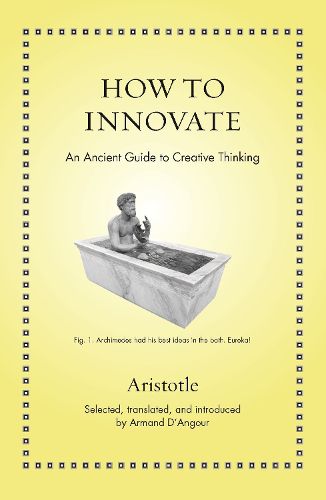Readings Newsletter
Become a Readings Member to make your shopping experience even easier.
Sign in or sign up for free!
You’re not far away from qualifying for FREE standard shipping within Australia
You’ve qualified for FREE standard shipping within Australia
The cart is loading…






When it comes to innovation and creative thinking, we are still catching up with the ancient Greeks. Between 800 and 300 BCE, they changed the world with astonishing inventions - democracy, the alphabet, philosophy, logic, rhetoric, mathematical proof, rational medicine, coins, architectural canons, drama, lifelike sculpture, and competitive athletics. None of this happened by accident. Recognising the power of the new and trying to understand and promote the conditions that make it possible, the Greeks were the first to write about innovation and even the first to record a word for forging something new. In short, the Greeks ‘invented’ innovation itself - and they still have a great deal to teach us about it.
How to Innovate is an engaging and entertaining introduction to key ideas about - and examples of - innovation and creative thinking from ancient Greece. Armand D'Angour provides lively new translations of selections from Aristotle, Diodorus, and Athenaeus, with the original Greek text on facing pages. These writings illuminate and illustrate timeless principles of creating something new - borrowing or adapting existing ideas or things, cross-fertilising disparate elements, or criticising and disrupting current conditions.
From the true story of Archimedes’s famous Eureka! moment, to Aristotle’s thoughts on physical change and political innovation, to accounts of how disruption and competition drove invention in Greek warfare and the visual arts, How to Innovate is filled with valuable insights about how change happens - and how to bring it about.
$9.00 standard shipping within Australia
FREE standard shipping within Australia for orders over $100.00
Express & International shipping calculated at checkout
When it comes to innovation and creative thinking, we are still catching up with the ancient Greeks. Between 800 and 300 BCE, they changed the world with astonishing inventions - democracy, the alphabet, philosophy, logic, rhetoric, mathematical proof, rational medicine, coins, architectural canons, drama, lifelike sculpture, and competitive athletics. None of this happened by accident. Recognising the power of the new and trying to understand and promote the conditions that make it possible, the Greeks were the first to write about innovation and even the first to record a word for forging something new. In short, the Greeks ‘invented’ innovation itself - and they still have a great deal to teach us about it.
How to Innovate is an engaging and entertaining introduction to key ideas about - and examples of - innovation and creative thinking from ancient Greece. Armand D'Angour provides lively new translations of selections from Aristotle, Diodorus, and Athenaeus, with the original Greek text on facing pages. These writings illuminate and illustrate timeless principles of creating something new - borrowing or adapting existing ideas or things, cross-fertilising disparate elements, or criticising and disrupting current conditions.
From the true story of Archimedes’s famous Eureka! moment, to Aristotle’s thoughts on physical change and political innovation, to accounts of how disruption and competition drove invention in Greek warfare and the visual arts, How to Innovate is filled with valuable insights about how change happens - and how to bring it about.
Ancient Wisdom for Modern Readers presents the timeless and timely ideas of thinkers from the ancient world in accessible and enlightening new translations.